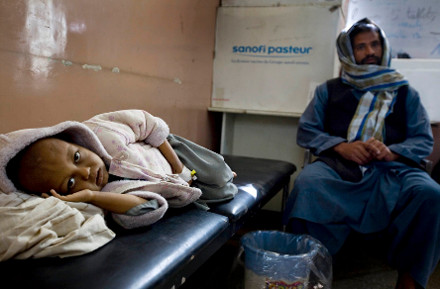Uncertain harvests are a perennial risk for rural Afghans, but two events stand out as exacerbating poverty - ill health, and the high cost of getting married, according to a new report.

Health costs can be devastating for poor families (Photo: Kate Holt/IRIN)
“While health expenditures placed considerable financial strain on households across different wealth groups, they hit the poor particularly hard,” says research by the Afghanistan Research and Evaluation Unit (AREU).
A household of seven spends an average of US$252 a year on health costs which can be devastating for poor families, according to the report based on interviews with representatives of 64 households in three provinces - Badakhshan, Kandahar, and Sar-i-Pul.
“Ill health in general is damaging,” Paula Kantor, the report’s author, told IRIN, adding that the ill health of a male worker was particularly detrimental to his household.
Major health crises often led to high debts and asset sales, while many poor families said they were unable to pay for a complete course of treatment as recommended by doctors.
“Poor households have to decide which ill member to treat, a trade off that ideally no family should have to face,” she said.
The situation is particularly grim in rural areas where access to healthcare services is limited.
Free of charge basic health services, financed by donors and delivered jointly by the government and NGOs, reach almost 80 percent of the country, but many Afghans prefer the better quality services provided by the private sector.
“There is misinformation that state hospitals lack capacity and offer bad or low quality services which prompt people to go to private hospitals. The reality is quite the opposite - state health centres are far better than private ones,” Abdullah Fahim, an adviser to the Ministry of Health, told IRIN.
Fahim acknowledged, however, that there was a lack of professional health workers, especially female health workers, at government health centres in rural areas. “In some areas female patients don’t go to a male doctor due to cultural restrictions.”
Poverty itself is considered a major cause of ill-health.
“Poor people who don’t have access to adequate food, water, sanitation and shelter and those who lack an appropriate sense of psycho-social security, are highly vulnerable to diseases,” said Fahim.
Expensive weddings
While marriages strengthen social relations, they are a significant financial outlay. The costs of a wedding feast - ranging from US$3,000-30,000 - can be devastating for a groom and his family, experts say.
“In many instances, financing a wedding led households to mount considerable debts and sell off productive assets,” said AREU’s research which noted that some poorer families were unable to marry off their sons due to prohibitively high bride prices.
In addition to wedding expenses, some families, particularly in rural areas, demand large sums as `Mahr’ (money paid by the groom to the bride at the time of marriage) and as a dowry. Such costs can threaten a family’s future livelihood security, experts say.
Religious scholars and officials say high marriage costs, though proscribed by Islam, are dictated by custom and practice in some areas.
“Unnecessary spending and profligacy at weddings and other parties are illegitimate in Islam,” Mohammad Seddiq Muslim, an official of the Supreme Court, told IRIN, adding that wedding costs were leading to poverty and corruption.
“There is a lot of personal, familial and tribal emulation, competition and rivalry associated with extravagant wedding parties,” said Ahmad Rasoul, a lecturer at the faculty of sociology at Kabul University.
Imposing spending limits from outside will not work, said the AREU report: “To properly counter the pressures of competition, conformity and pride that push bride prices higher, a local consensus on the benefits of spending limits must be built.



